CO
-
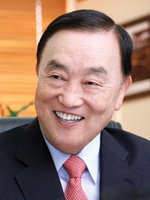 Former Minister of Science and Technology, Dr. KunMo Chung, Awarded KAIST Honorary Doctorate
KAIST will confer an honorary doctorate on former minister of Science and Technology, Dr. KunMo Chung, at the 2014 KAIST graduation ceremony on Friday, February, 21.Dr. Chung presented the Survey Report for the Establishment of the Korea Advanced Institute of Science (KAIS) to the United States Agency for International Development (USAID) in 1969. This proposal for nurturing the advanced science technology elite and boost Korean industrial development became the foundation for KAIS, which is now known as KAIST.After passing the KAIS Foundation Law in 1970, Dr. Chung designed the faculty room, secured faculty members, and acquired a $6 million education loan from the USAID. Dr. Chung devoted himself to research and teaching. His first appointment was the position of assistant professor at the University of South Florida, followed by research professor positions at the Princeton Nuclear Fusion Research Center and MIT Nuclear Engineering, and an associate professor position in the Department of Electrophysics at the Polytechnic Institute of New York.When KAIS was founded on Feb. 16, 1971, 31-year-old Dr. KunMo Chung became the provost and a professor in the Electronic and Electrical Science Department where he made outstanding contributions to the development of science and technology in Korea.
2014.02.21 View 12387
Former Minister of Science and Technology, Dr. KunMo Chung, Awarded KAIST Honorary Doctorate
KAIST will confer an honorary doctorate on former minister of Science and Technology, Dr. KunMo Chung, at the 2014 KAIST graduation ceremony on Friday, February, 21.Dr. Chung presented the Survey Report for the Establishment of the Korea Advanced Institute of Science (KAIS) to the United States Agency for International Development (USAID) in 1969. This proposal for nurturing the advanced science technology elite and boost Korean industrial development became the foundation for KAIS, which is now known as KAIST.After passing the KAIS Foundation Law in 1970, Dr. Chung designed the faculty room, secured faculty members, and acquired a $6 million education loan from the USAID. Dr. Chung devoted himself to research and teaching. His first appointment was the position of assistant professor at the University of South Florida, followed by research professor positions at the Princeton Nuclear Fusion Research Center and MIT Nuclear Engineering, and an associate professor position in the Department of Electrophysics at the Polytechnic Institute of New York.When KAIS was founded on Feb. 16, 1971, 31-year-old Dr. KunMo Chung became the provost and a professor in the Electronic and Electrical Science Department where he made outstanding contributions to the development of science and technology in Korea.
2014.02.21 View 12387 -
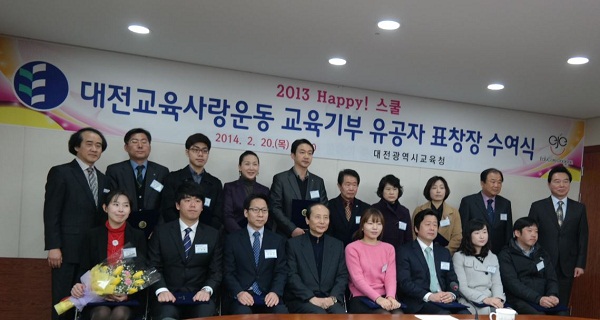 A student club for education donation at KAIST received an award from the City of Daejeon Education Superintendent
One of the student clubs at KAIST, the Midam Scholarship Fund, was awarded by the education superintendent of Daejeon City in recognition of its contributions to the education benefits of underprivileged students in the region.The Midam Scholarship Fund was established in 2009, and since then, it has helped many teenage students who are suffering financial hardships through knowledge donation. The Fund organized private classes and mentoring programs for the students as well as collaborating with other education donation clubs at seven different universities in Korea.The award ceremony was held on February 20th at the City Hall in Daejeon.
2014.02.21 View 8801
A student club for education donation at KAIST received an award from the City of Daejeon Education Superintendent
One of the student clubs at KAIST, the Midam Scholarship Fund, was awarded by the education superintendent of Daejeon City in recognition of its contributions to the education benefits of underprivileged students in the region.The Midam Scholarship Fund was established in 2009, and since then, it has helped many teenage students who are suffering financial hardships through knowledge donation. The Fund organized private classes and mentoring programs for the students as well as collaborating with other education donation clubs at seven different universities in Korea.The award ceremony was held on February 20th at the City Hall in Daejeon.
2014.02.21 View 8801 -
 KAIST developed an extremely low-powered, high-performance head-mounted display embedding an augmented reality chip
Walking around the streets searching for a place to eat will be no hassle when a head-mounted display (HMD) becomes affordable and ubiquitous. Researchers at the Korea Advanced Institute of Science and Technology (KAIST) developed K-Glass, a wearable, hands-free HMD that enables users to find restaurants while checking out their menus. If the user of K-Glass walks up to a restaurant and looks at the name of the restaurant, today’s menu and a 3D image of food pop up. The Glass can even show the number of tables available inside the restaurant. K-Glass makes this possible because of its built-in augmented reality (AR) processor. Unlike virtual reality which replaces the real world with a computer-simulated environment, AR incorporates digital data generated by the computer into the reality of a user. With the computer-made sensory inputs such as sound, video, graphics or GPS data, the user’s real and physical world becomes live and interactive. Augmentation takes place in real-time and in semantic context with surrounding environments, such as a menu list overlain on the signboard of a restaurant when the user passes by it, not an airplane flight schedule, which is irrelevant information, displayed. Most commonly, location-based or computer-vision services are used in order to generate AR effects. Location-based services activate motion sensors to identify the user’s surroundings, whereas computer-vision uses algorithms such as facial, pattern, and optical character recognition, or object and motion tracking to distinguish images and objects. Many of the current HMDs deliver augmented reality experiences employing location-based services by scanning the markers or barcodes printed on the back of objects. The AR system tracks the codes or markers to identify objects and then align them with virtual reality. However, this AR algorithm is difficult to use for the objects or spaces which do not have barcodes, QR codes, or markers, particularly those in outdoor environments and thus cannot be recognized. To solve this problem, Hoi-Jun Yoo, Professor of Electrical Engineering at KAIST and his team developed, for the first time in the world, an AR chip that works just like human vision. This processor is based on the Visual Attention Model (VAM) that duplicates the ability of human brain to process visual data. VAM, almost unconsciously or automatically, disentangles the most salient and relevant information about the environment in which human vision operates, thereby eliminating unnecessary data unless they must be processed. In return, the processor can dramatically speed up the computation of complex AR algorithms. The AR processor has a data processing network similar to that of a human brain’s central nervous system. When the human brain perceives visual data, different sets of neurons, all connected, work concurrently on each fragment of a decision-making process; one group’s work is relayed to other group of neurons for the next round of the process, which continues until a set of decider neurons determines the character of the data. Likewise, the artificial neural network allows parallel data processing, alleviating data congestion and reducing power consumption significantly. KAIST’s AR processor, which is produced using the 65 nm (nanometers) manufacturing process with the area of 32 mm2, delivers 1.22 TOPS (tera-operations per second) peak performance when running at 250 MHz and consumes 778 miliWatts on a 1.2V power supply. The ultra-low power processor shows 1.57 TOPS/W high efficiency rate of energy consumption under the real-time operation of 30fps/720p video camera, a 76% improvement in power conservation over other devices. The HMDs, available on the market including the Project Glass whose battery lasts only for two hours, have revealed so far poor performance. Professor Yoo said, “Our processor can work for long hours without sacrificing K-Glass’s high performance, an ideal mobile gadget or wearable computer, which users can wear for almost the whole day.” He further commented:“HMDs will become the next mobile device, eventually taking over smartphones. Their markets have been growing fast, and it’s really a matter of time before mobile users will eventually embrace an optical see-through HMD as part of their daily use. Through augmented reality, we will have richer, deeper, and more powerful reality in all aspects of our life from education, business, and entertainment to art and culture.” The KAIST team presented a research paper at the International Solid-State Circuits Conference (ISSCC) held on February 9-13, 2014 in San Francisco, CA, which is entitled “1.22TOPS and 1.52mW/MHz Augmented Reality Multi-Core Processor with Neural Network NoC for HMD Applications.”Youtube Link: http://www.youtube.com/watch?v=wSqY30FOu2s&feature=c4-overview&list=UUirZA3OFhxP4YFreIJkTtXw
2014.02.20 View 19114
KAIST developed an extremely low-powered, high-performance head-mounted display embedding an augmented reality chip
Walking around the streets searching for a place to eat will be no hassle when a head-mounted display (HMD) becomes affordable and ubiquitous. Researchers at the Korea Advanced Institute of Science and Technology (KAIST) developed K-Glass, a wearable, hands-free HMD that enables users to find restaurants while checking out their menus. If the user of K-Glass walks up to a restaurant and looks at the name of the restaurant, today’s menu and a 3D image of food pop up. The Glass can even show the number of tables available inside the restaurant. K-Glass makes this possible because of its built-in augmented reality (AR) processor. Unlike virtual reality which replaces the real world with a computer-simulated environment, AR incorporates digital data generated by the computer into the reality of a user. With the computer-made sensory inputs such as sound, video, graphics or GPS data, the user’s real and physical world becomes live and interactive. Augmentation takes place in real-time and in semantic context with surrounding environments, such as a menu list overlain on the signboard of a restaurant when the user passes by it, not an airplane flight schedule, which is irrelevant information, displayed. Most commonly, location-based or computer-vision services are used in order to generate AR effects. Location-based services activate motion sensors to identify the user’s surroundings, whereas computer-vision uses algorithms such as facial, pattern, and optical character recognition, or object and motion tracking to distinguish images and objects. Many of the current HMDs deliver augmented reality experiences employing location-based services by scanning the markers or barcodes printed on the back of objects. The AR system tracks the codes or markers to identify objects and then align them with virtual reality. However, this AR algorithm is difficult to use for the objects or spaces which do not have barcodes, QR codes, or markers, particularly those in outdoor environments and thus cannot be recognized. To solve this problem, Hoi-Jun Yoo, Professor of Electrical Engineering at KAIST and his team developed, for the first time in the world, an AR chip that works just like human vision. This processor is based on the Visual Attention Model (VAM) that duplicates the ability of human brain to process visual data. VAM, almost unconsciously or automatically, disentangles the most salient and relevant information about the environment in which human vision operates, thereby eliminating unnecessary data unless they must be processed. In return, the processor can dramatically speed up the computation of complex AR algorithms. The AR processor has a data processing network similar to that of a human brain’s central nervous system. When the human brain perceives visual data, different sets of neurons, all connected, work concurrently on each fragment of a decision-making process; one group’s work is relayed to other group of neurons for the next round of the process, which continues until a set of decider neurons determines the character of the data. Likewise, the artificial neural network allows parallel data processing, alleviating data congestion and reducing power consumption significantly. KAIST’s AR processor, which is produced using the 65 nm (nanometers) manufacturing process with the area of 32 mm2, delivers 1.22 TOPS (tera-operations per second) peak performance when running at 250 MHz and consumes 778 miliWatts on a 1.2V power supply. The ultra-low power processor shows 1.57 TOPS/W high efficiency rate of energy consumption under the real-time operation of 30fps/720p video camera, a 76% improvement in power conservation over other devices. The HMDs, available on the market including the Project Glass whose battery lasts only for two hours, have revealed so far poor performance. Professor Yoo said, “Our processor can work for long hours without sacrificing K-Glass’s high performance, an ideal mobile gadget or wearable computer, which users can wear for almost the whole day.” He further commented:“HMDs will become the next mobile device, eventually taking over smartphones. Their markets have been growing fast, and it’s really a matter of time before mobile users will eventually embrace an optical see-through HMD as part of their daily use. Through augmented reality, we will have richer, deeper, and more powerful reality in all aspects of our life from education, business, and entertainment to art and culture.” The KAIST team presented a research paper at the International Solid-State Circuits Conference (ISSCC) held on February 9-13, 2014 in San Francisco, CA, which is entitled “1.22TOPS and 1.52mW/MHz Augmented Reality Multi-Core Processor with Neural Network NoC for HMD Applications.”Youtube Link: http://www.youtube.com/watch?v=wSqY30FOu2s&feature=c4-overview&list=UUirZA3OFhxP4YFreIJkTtXw
2014.02.20 View 19114 -
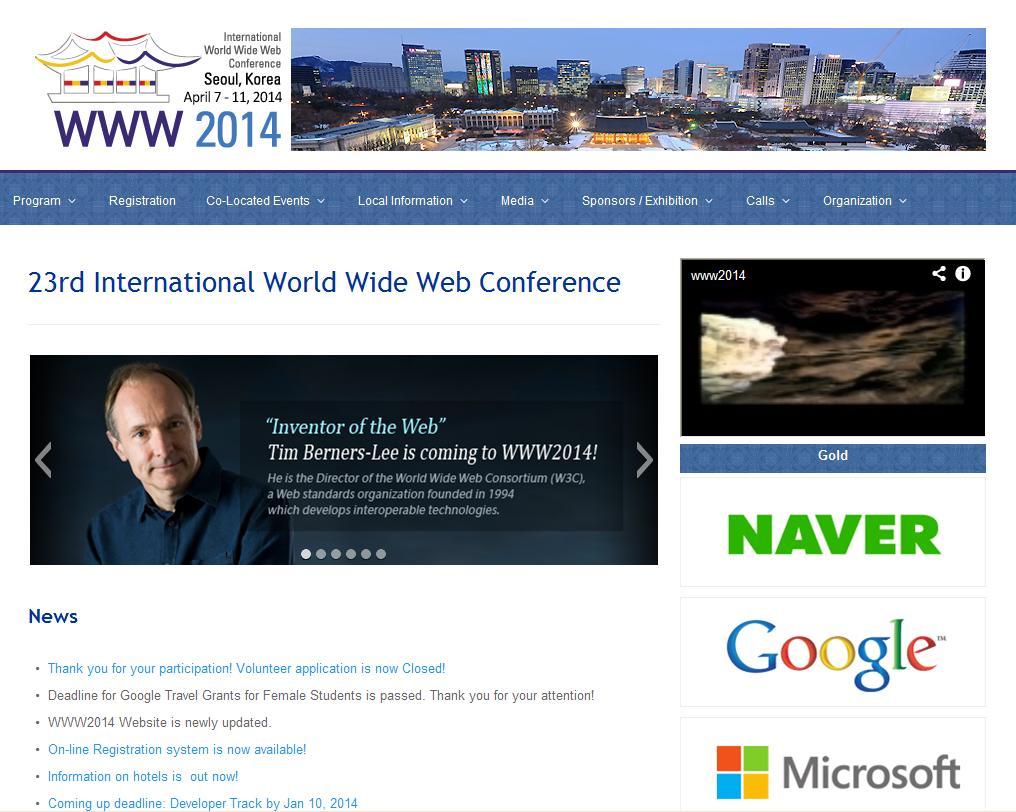 World's Largest Web Conference To Be Held in Korea
The 2014 International World Wide Web Conference (WWW 2014), the world’s most prestigious academic conference in the field of web, will be held for the first time in Korea. The conference is to be last for five days at Seoul COEX, from 7th to 11th April. International World Wide Web Conference covers a wide range of web-related areas, including technologies, research papers, services and more. Since the first conference in 1994 in Switzerland, it has been held in various parts of North America, Europe, South America and Asia, attracting more than 1000 experts in the field. The 23rd International World Wide Web Conference is managed by the International World Wide Web Conferences Steering Committee (IW3C2) and co-hosted by KAIST and National Agency for Technology and Standards, as well as sponsored by Korea Information Science Society and the World Wide Web Consortium (W3C). Keynote speakers for this year’s conference include inventor of the World Wide Web, Sir Tim Berners-Lee, senior vice president of Microsoft, Dr. Qi Lu, and Carnegie Mellon University’s Prof. Christos Faloutsos, as well as Samsung Electronic’s vice president Jong-Deok Choi. In addition to WWW 2014, BigData Innovators Gathering (BIG 2014) and Web for Access (W4A 2014) is also to be held in joint. KAIST Computer Sciences Department’s Prof. Jinwan Jeong, in charge of directing this year’s conference, said “From one-sided 1st generation web to two-way 2nd generation web, such as blogs, and then recently to the 3rd generation web, which include social networks and semantic webs, the web technologies has grown vastly over the past 25 years. WWW 2014 will be the opportunity for Korea to discuss with the world about the informatization and future of the web.” Pre-registration for WWW 2014 can be applied at the official webpage for WWW 2014 (http://www2014.kr) before 17th February.
2014.02.14 View 12846
World's Largest Web Conference To Be Held in Korea
The 2014 International World Wide Web Conference (WWW 2014), the world’s most prestigious academic conference in the field of web, will be held for the first time in Korea. The conference is to be last for five days at Seoul COEX, from 7th to 11th April. International World Wide Web Conference covers a wide range of web-related areas, including technologies, research papers, services and more. Since the first conference in 1994 in Switzerland, it has been held in various parts of North America, Europe, South America and Asia, attracting more than 1000 experts in the field. The 23rd International World Wide Web Conference is managed by the International World Wide Web Conferences Steering Committee (IW3C2) and co-hosted by KAIST and National Agency for Technology and Standards, as well as sponsored by Korea Information Science Society and the World Wide Web Consortium (W3C). Keynote speakers for this year’s conference include inventor of the World Wide Web, Sir Tim Berners-Lee, senior vice president of Microsoft, Dr. Qi Lu, and Carnegie Mellon University’s Prof. Christos Faloutsos, as well as Samsung Electronic’s vice president Jong-Deok Choi. In addition to WWW 2014, BigData Innovators Gathering (BIG 2014) and Web for Access (W4A 2014) is also to be held in joint. KAIST Computer Sciences Department’s Prof. Jinwan Jeong, in charge of directing this year’s conference, said “From one-sided 1st generation web to two-way 2nd generation web, such as blogs, and then recently to the 3rd generation web, which include social networks and semantic webs, the web technologies has grown vastly over the past 25 years. WWW 2014 will be the opportunity for Korea to discuss with the world about the informatization and future of the web.” Pre-registration for WWW 2014 can be applied at the official webpage for WWW 2014 (http://www2014.kr) before 17th February.
2014.02.14 View 12846 -
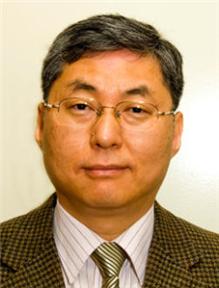 Professor Hoi-Jun Yoo Appointed as the First Asian University Chairman of the ISSCC
Hoi-Jun Yoo, a professor of Electrical Engineering Department at KAIST, was chosen to be the first Asian University Chairman of the ISSCC (International Solid-State Circuits Conference) held in San Francisco, USA, from February 10 to 13, 2014. His term will last one year from April, 2014. Professor Yoo ranked tenth globally in thesis achievement over the 60-year history of the ISSCC. He ranked fourth globally over the last ten years and was the highest-ranked member from Asia over that time. He received an award for this remarkable achievement in 2012. ISSC is a world-renowned conference in the semiconductor field, where only 200 strictly selected papers are presented by semiconductor-related enterprises, research centers, and university representatives. Nicknamed the “The Olympics of the Semiconductor”, ISSCC runs for 4 days and hosts more than 3000 semiconductor engineers from around the world. It is most famous for the first CPU presentation by Intel and the first memory technology release of Samsung. Professor Yoo stated, “The Korean Semiconductor Engineering is leading the world’s technology instead of imitating it.” He aspires to devote himself to upgrading semiconductor engineering around the world.
2014.02.14 View 12420
Professor Hoi-Jun Yoo Appointed as the First Asian University Chairman of the ISSCC
Hoi-Jun Yoo, a professor of Electrical Engineering Department at KAIST, was chosen to be the first Asian University Chairman of the ISSCC (International Solid-State Circuits Conference) held in San Francisco, USA, from February 10 to 13, 2014. His term will last one year from April, 2014. Professor Yoo ranked tenth globally in thesis achievement over the 60-year history of the ISSCC. He ranked fourth globally over the last ten years and was the highest-ranked member from Asia over that time. He received an award for this remarkable achievement in 2012. ISSC is a world-renowned conference in the semiconductor field, where only 200 strictly selected papers are presented by semiconductor-related enterprises, research centers, and university representatives. Nicknamed the “The Olympics of the Semiconductor”, ISSCC runs for 4 days and hosts more than 3000 semiconductor engineers from around the world. It is most famous for the first CPU presentation by Intel and the first memory technology release of Samsung. Professor Yoo stated, “The Korean Semiconductor Engineering is leading the world’s technology instead of imitating it.” He aspires to devote himself to upgrading semiconductor engineering around the world.
2014.02.14 View 12420 -
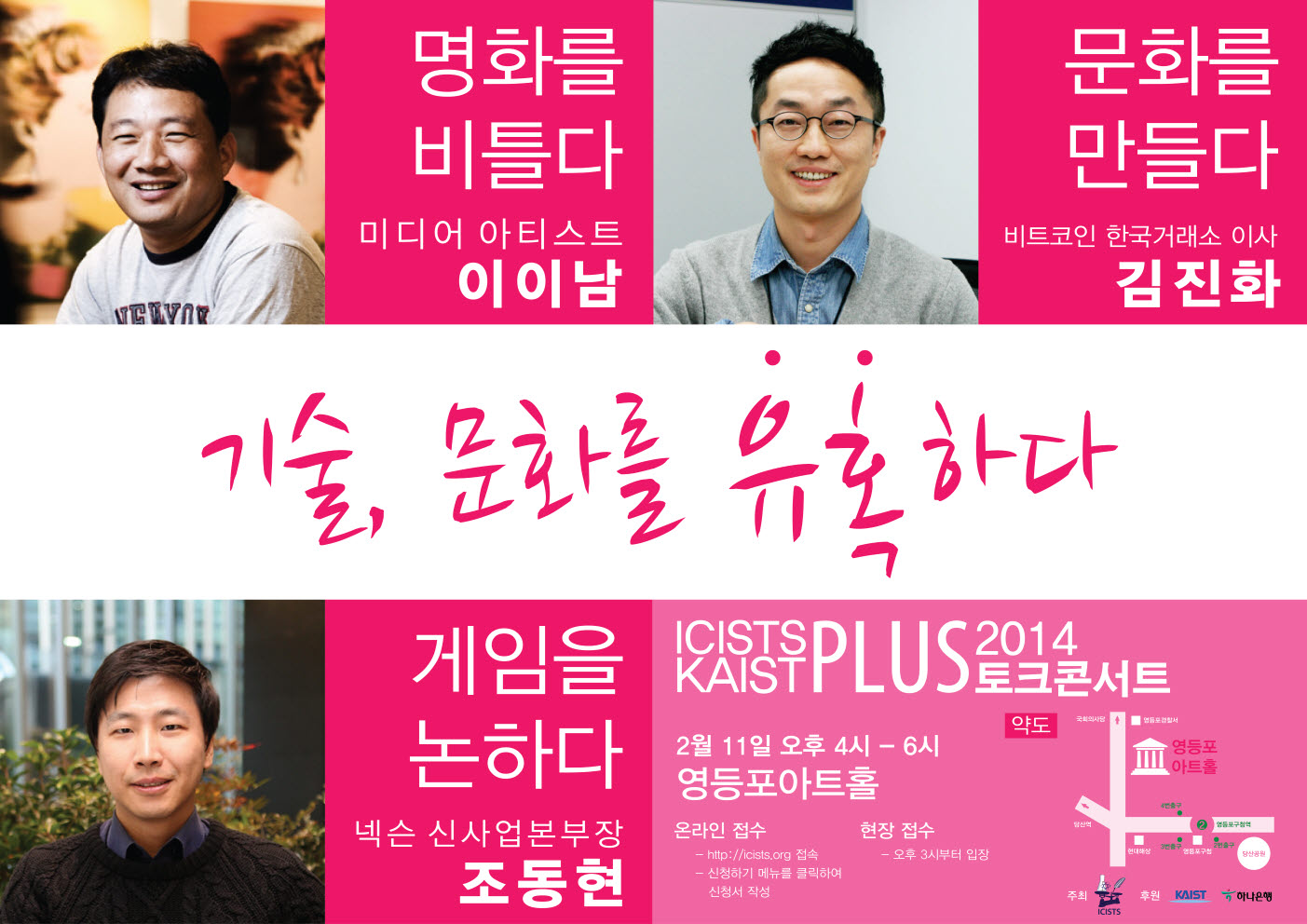 ICISTS-KAIST Talk Concert 2014
The International Conference for the Integration of Science, Technology and Society at KAIST (ICISTS-KAIST) will hold a talk entitled “Scientific Technology and Culture” at Youngdungpo Art Hall in Seoul on Tuesday, February 11, 2014.The three main presenters will be: Jin-Hwa Kim, Director of Korbit, Dong-Hyeon Jo, Chief of New Business at Nexon, and media artist Yi-Nam Lee. They will address the meeting of culture and scientific technology in the fields of art, games, and other genres.Jin-Hwa Kim is the director of Korbit, the first Korean bitcoin exchange, and wrote The Next Money: Bitcoin, the world’s first bitcoin textbook. He will elaborate on how science and technology are constantly changing and have affected popular culture, and how public demand gave birth to bitcoin.Dong-Hyeon Jo from Nexon will explain how the appearance of new media and platforms such as smartphones has changed our lives.Media artist Yi-Nam Lee has been described as “the second Nam-June Paik,” an internationally-acclaimed video artist, for his integration of oriental and western masterpieces with modern media. During the event, samples of his artwork will be displayed.ICISTS-KAIST is a student organization which has held a conference every year since 2005 with hundreds of students attending from many parts of the world, Asia in particular.
2014.02.07 View 12431
ICISTS-KAIST Talk Concert 2014
The International Conference for the Integration of Science, Technology and Society at KAIST (ICISTS-KAIST) will hold a talk entitled “Scientific Technology and Culture” at Youngdungpo Art Hall in Seoul on Tuesday, February 11, 2014.The three main presenters will be: Jin-Hwa Kim, Director of Korbit, Dong-Hyeon Jo, Chief of New Business at Nexon, and media artist Yi-Nam Lee. They will address the meeting of culture and scientific technology in the fields of art, games, and other genres.Jin-Hwa Kim is the director of Korbit, the first Korean bitcoin exchange, and wrote The Next Money: Bitcoin, the world’s first bitcoin textbook. He will elaborate on how science and technology are constantly changing and have affected popular culture, and how public demand gave birth to bitcoin.Dong-Hyeon Jo from Nexon will explain how the appearance of new media and platforms such as smartphones has changed our lives.Media artist Yi-Nam Lee has been described as “the second Nam-June Paik,” an internationally-acclaimed video artist, for his integration of oriental and western masterpieces with modern media. During the event, samples of his artwork will be displayed.ICISTS-KAIST is a student organization which has held a conference every year since 2005 with hundreds of students attending from many parts of the world, Asia in particular.
2014.02.07 View 12431 -
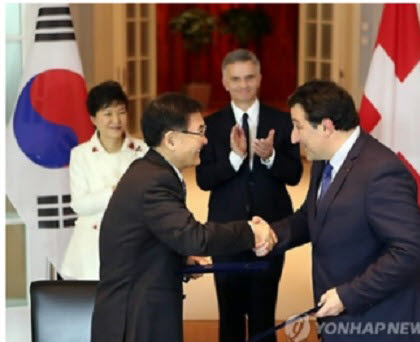 2014 Davos Forum: KAIST-EPFL Connection
The Korean-American Science and Technology News (KASTN), a biweekly global electronic newsletter carrying news and analyses in science and technology, as well as social, economic, and cultural issues related to the general interest of the Korean-American professional community, published an article on the partnership agreement made by KAIST and the Ecole Polytechnique Federale Lausanne (EPFL) during the 2014 World Economic Forum held at Davos, Switzerland, from January 22nd to 25th.
For the article, please click the link below: KASTN Issue 14-05, February 26, 2014
http://www.phy.duke.edu/~myhan/b_14-05.pdf
2014.02.04 View 10570
2014 Davos Forum: KAIST-EPFL Connection
The Korean-American Science and Technology News (KASTN), a biweekly global electronic newsletter carrying news and analyses in science and technology, as well as social, economic, and cultural issues related to the general interest of the Korean-American professional community, published an article on the partnership agreement made by KAIST and the Ecole Polytechnique Federale Lausanne (EPFL) during the 2014 World Economic Forum held at Davos, Switzerland, from January 22nd to 25th.
For the article, please click the link below: KASTN Issue 14-05, February 26, 2014
http://www.phy.duke.edu/~myhan/b_14-05.pdf
2014.02.04 View 10570 -
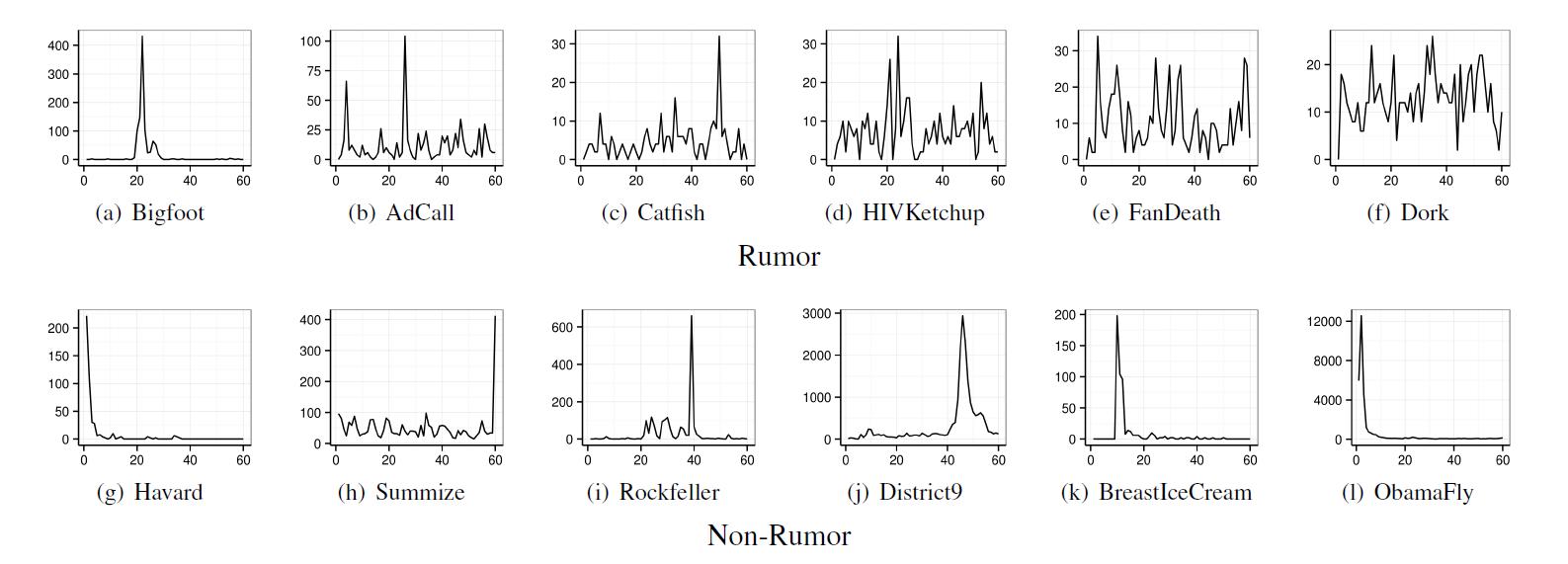 Is it possible to identify rumors on SNS?
Rumors
sporadically spread with people with fewer followers in the centerResearched
over 100 rumors in the US from 2006 to 2009 Is it
possible to filter information on SNS such as Twitter and Facebook? A research
team led by Professor Mee-Young Cha from the Department of Cultural Technology
Graduate School at KAIST, Professor Kyo-Min Jung of Seoul National University,
Doctor Wei Chen and Yajun Wang of Microsoft Asia, has developed a technology
that can accurately filter out information on Twitter to 90% accuracy. The
research not only deduced a new mathematical model, network structure, and
linguistic characteristics on rumors from SNS data, but is also expected to
enhance the effort to make secure technology to regulate Internet rumors. The team
analysed the characteristics of rumors in over 100 widespread cases in the US
from 2006 to 2009 on Twitter. The team gathered data, which included a range of
areas such as politics, IT, health and celebrity gossips, and their analysis
could identify rumors to 90% accuracy. The filtering was more accurate in
rumors that included slanders or insults. The
research team identified three characteristics of the spread of rumors. Firstly,
rumors spread continuously. Normal news spreads widely once and is mentioned
rarely again on media, but rumors tend to continue for years. Secondly,
rumors spread through sporadic participation of random users with no
connections. Rumors start from people with fewer followers and spread to the
more popular. This phenomenon is often observed in rumors concerning
celebrities or politicians. Lastly,
rumors have unique linguistic characteristics. Rumors frequently include words
(such as “it may be true,” “although not certain, I think,” “although I cannot
fully remember”) related to psychological processes that question, deny, or
infer the reliability of the information. Professor
Cha said, “This research deduced not only a statistical and mathematical model
but also is an integrated research on social psychological theory on the
characteristics of rumors that attract great attention from the society based
on ample data.” The results
were made public in IEEE International Conference on Data Mining last December
in Texas, USA.
2014.02.03 View 12357
Is it possible to identify rumors on SNS?
Rumors
sporadically spread with people with fewer followers in the centerResearched
over 100 rumors in the US from 2006 to 2009 Is it
possible to filter information on SNS such as Twitter and Facebook? A research
team led by Professor Mee-Young Cha from the Department of Cultural Technology
Graduate School at KAIST, Professor Kyo-Min Jung of Seoul National University,
Doctor Wei Chen and Yajun Wang of Microsoft Asia, has developed a technology
that can accurately filter out information on Twitter to 90% accuracy. The
research not only deduced a new mathematical model, network structure, and
linguistic characteristics on rumors from SNS data, but is also expected to
enhance the effort to make secure technology to regulate Internet rumors. The team
analysed the characteristics of rumors in over 100 widespread cases in the US
from 2006 to 2009 on Twitter. The team gathered data, which included a range of
areas such as politics, IT, health and celebrity gossips, and their analysis
could identify rumors to 90% accuracy. The filtering was more accurate in
rumors that included slanders or insults. The
research team identified three characteristics of the spread of rumors. Firstly,
rumors spread continuously. Normal news spreads widely once and is mentioned
rarely again on media, but rumors tend to continue for years. Secondly,
rumors spread through sporadic participation of random users with no
connections. Rumors start from people with fewer followers and spread to the
more popular. This phenomenon is often observed in rumors concerning
celebrities or politicians. Lastly,
rumors have unique linguistic characteristics. Rumors frequently include words
(such as “it may be true,” “although not certain, I think,” “although I cannot
fully remember”) related to psychological processes that question, deny, or
infer the reliability of the information. Professor
Cha said, “This research deduced not only a statistical and mathematical model
but also is an integrated research on social psychological theory on the
characteristics of rumors that attract great attention from the society based
on ample data.” The results
were made public in IEEE International Conference on Data Mining last December
in Texas, USA.
2014.02.03 View 12357 -
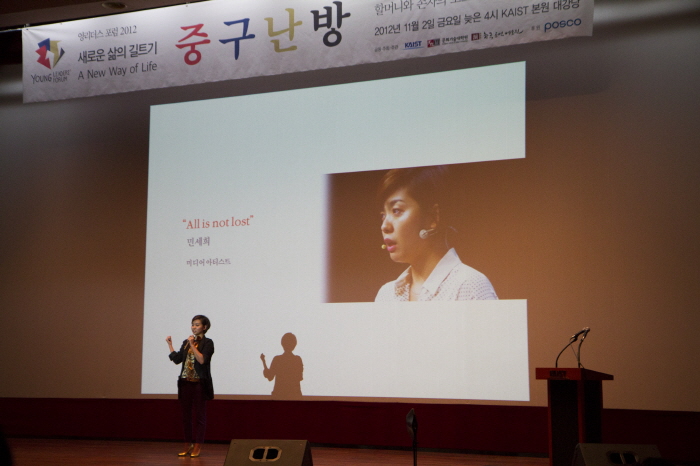 Collaborated Performance and Talk Battle Event Held by Graduate School of Culture Technology, KAIST
A unique event consisting of a new media performance and talk battle was held for middle school, high school, and college students during the winter break.
The Graduate School of Culture Technology at KAIST and the Korea Art Conservatory co-organized the 3rd Young Leaders Forum under the title “Collaboration of the Current and the New Culture” on January 18th at the Seoul Namsan Traditional Theater.
The Young Leaders Forum was founded to share knowledge and wisdom among different fields and generations and to foster creative lifestyles through the collaboration of wisdom.
The collaborated performance, “The Garden of Western Heaven”, was performed using new media technology by students from the Graduate School of Culture Technology and actors from the Korea Art Conservatory.
Three panels participated in the “Talk Battle” and held a discussion on “The New Culture from Performance and Collaboration”.
Woong-Rae Cho, CEO of The Mackiss Company, who sponsored the clay road in Gyejok Mountain and the Concert in the Forest, Professor Sung-Kuk Kim from School of Korean Music at Chung-Ang University, and Je-Ho Oh, a graduate student from the Graduate School of Culture Technology at KAIST participated in the discussion and shared their opinions with the audience.
2014.01.27 View 7118
Collaborated Performance and Talk Battle Event Held by Graduate School of Culture Technology, KAIST
A unique event consisting of a new media performance and talk battle was held for middle school, high school, and college students during the winter break.
The Graduate School of Culture Technology at KAIST and the Korea Art Conservatory co-organized the 3rd Young Leaders Forum under the title “Collaboration of the Current and the New Culture” on January 18th at the Seoul Namsan Traditional Theater.
The Young Leaders Forum was founded to share knowledge and wisdom among different fields and generations and to foster creative lifestyles through the collaboration of wisdom.
The collaborated performance, “The Garden of Western Heaven”, was performed using new media technology by students from the Graduate School of Culture Technology and actors from the Korea Art Conservatory.
Three panels participated in the “Talk Battle” and held a discussion on “The New Culture from Performance and Collaboration”.
Woong-Rae Cho, CEO of The Mackiss Company, who sponsored the clay road in Gyejok Mountain and the Concert in the Forest, Professor Sung-Kuk Kim from School of Korean Music at Chung-Ang University, and Je-Ho Oh, a graduate student from the Graduate School of Culture Technology at KAIST participated in the discussion and shared their opinions with the audience.
2014.01.27 View 7118 -
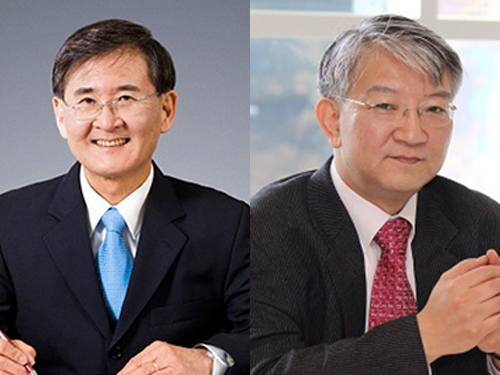 KAIST Participates in the 2014 Davos Forum on January 22-25 in Switzerland
Through the sessions of the Global University Leaders Forum, IdeasLab, and Global Agenda Councils on Biotechnology, KAIST participants will actively engage with global leaders in the discussion of issues on education innovation and technological breakthroughs.
The 2014 Annual Meeting of the World Economic Forum (WEF), known as the Davos Forum, will kick off on January 22-25 in Davos-Klosters, Switzerland, under the theme of "The Reshaping of the World: Consequences for Society, Politics, and Business." Each year, the Forum attracts about 2,500 distinguished leaders from all around the world and provides an open platform to identify the current and emerging challenges facing the global community and to develop ideas and actions necessary to respond to such challenges.
President Sung-Mo Steve Kang and Distinguished Professor Sang Yup Lee from the Department of Chemical and Biomolecular Engineering, KAIST, will attend the Forum and engage in a series of dialogues on such issues as Massive Open Online Courses, new paradigms for universities and researchers, the transformation of higher education, the role and value of scientific discoveries, and the impact of biotechnology on the future of society and business.
At the session entitled "New Paradigms for Universities of the Future" hosted by the Global University Leaders Forum (GULF), President Kang will introduce KAIST"s ongoing online education program, Education 3.0. GULF was created in 2006 by WEF, which is a small community of the presidents and senior representatives of the top universities in the world.
Implemented in 2012, Education 3.0 incorporates advanced information and communications technology (ICT) to offer students and teachers a learner-based, team-oriented learning and teaching environment. Under Education 3.0, students study online and meet in groups with a professor for in-depth discussions, collaboration, and problem-solving. KAIST plans to expand the program to embrace the global community in earnest by establishing Education 3.0 Global in order to have interactive real-time classes for students and researchers across regions and cultures.
President Kang will also present a paper entitled "Toward Socially Responsible Technology: KAIST"s Approach to Integrating Social and Behavioral Perspectives into Technology Development" at another session of GULF called "Seeking New Approaches to Critical Global Challenges." In the paper, President Kang points out that notwithstanding the many benefits we enjoy from the increasingly interconnected world, digital media may pose a threat to become a new outlet for social problems, for example, Internet or digital addiction.
Experts say that early exposure to digital devices harms the healthy development of cognitive functions, emotions, and social behavior. President Kang will introduce KAIST"s recent endeavor to develop a non-intrusive technology to help prevent digital addiction, which will ultimately be embedded in the form of a virtual coach or mentor that helps and guides people under risk to make constructive use of digital devices. President Kang stresses the fundamental shift in the science and technology development paradigm from research and development (R&D) to a research and solution development (R&SD), taking serious consideration of societal needs, quality of life, and social impacts when conducting research.
Professor Sang Yup Lee will moderate the IdeasLab session at the Davos Forum entitled "From Lab to Life with the California Institute of Technology (Caltech)." Together with scientists from Caltech, he will discuss scientific breakthroughs that transform institutions, industries, and individuals in the near future, such as the development of damage-tolerant lightweight materials with nanotechnology, the ability to read and write genomes, and wireless lab-in-the-body monitors. In addition, he will meet global business leaders at the session of "Sustainability, Innovation, and Growth" and speak about how emerging technologies, biotechnology in particular, will transform future societies, business, and industries.
As a current special adviser of the World Economic Forum"s (WEF) Chemicals Industry Community, Professor Lee will meet global chairs and chief executive officers of chemical companies and discuss ways to advance the industry to become more bio-based and environmentally friendly. He served as a founding chairman of WEF"s Global Agenda Councils on Biotechnology in 2013.
President Sung-Mo Steve Kang Distinguished Professor Sang Yup Lee
2014.01.17 View 12784
KAIST Participates in the 2014 Davos Forum on January 22-25 in Switzerland
Through the sessions of the Global University Leaders Forum, IdeasLab, and Global Agenda Councils on Biotechnology, KAIST participants will actively engage with global leaders in the discussion of issues on education innovation and technological breakthroughs.
The 2014 Annual Meeting of the World Economic Forum (WEF), known as the Davos Forum, will kick off on January 22-25 in Davos-Klosters, Switzerland, under the theme of "The Reshaping of the World: Consequences for Society, Politics, and Business." Each year, the Forum attracts about 2,500 distinguished leaders from all around the world and provides an open platform to identify the current and emerging challenges facing the global community and to develop ideas and actions necessary to respond to such challenges.
President Sung-Mo Steve Kang and Distinguished Professor Sang Yup Lee from the Department of Chemical and Biomolecular Engineering, KAIST, will attend the Forum and engage in a series of dialogues on such issues as Massive Open Online Courses, new paradigms for universities and researchers, the transformation of higher education, the role and value of scientific discoveries, and the impact of biotechnology on the future of society and business.
At the session entitled "New Paradigms for Universities of the Future" hosted by the Global University Leaders Forum (GULF), President Kang will introduce KAIST"s ongoing online education program, Education 3.0. GULF was created in 2006 by WEF, which is a small community of the presidents and senior representatives of the top universities in the world.
Implemented in 2012, Education 3.0 incorporates advanced information and communications technology (ICT) to offer students and teachers a learner-based, team-oriented learning and teaching environment. Under Education 3.0, students study online and meet in groups with a professor for in-depth discussions, collaboration, and problem-solving. KAIST plans to expand the program to embrace the global community in earnest by establishing Education 3.0 Global in order to have interactive real-time classes for students and researchers across regions and cultures.
President Kang will also present a paper entitled "Toward Socially Responsible Technology: KAIST"s Approach to Integrating Social and Behavioral Perspectives into Technology Development" at another session of GULF called "Seeking New Approaches to Critical Global Challenges." In the paper, President Kang points out that notwithstanding the many benefits we enjoy from the increasingly interconnected world, digital media may pose a threat to become a new outlet for social problems, for example, Internet or digital addiction.
Experts say that early exposure to digital devices harms the healthy development of cognitive functions, emotions, and social behavior. President Kang will introduce KAIST"s recent endeavor to develop a non-intrusive technology to help prevent digital addiction, which will ultimately be embedded in the form of a virtual coach or mentor that helps and guides people under risk to make constructive use of digital devices. President Kang stresses the fundamental shift in the science and technology development paradigm from research and development (R&D) to a research and solution development (R&SD), taking serious consideration of societal needs, quality of life, and social impacts when conducting research.
Professor Sang Yup Lee will moderate the IdeasLab session at the Davos Forum entitled "From Lab to Life with the California Institute of Technology (Caltech)." Together with scientists from Caltech, he will discuss scientific breakthroughs that transform institutions, industries, and individuals in the near future, such as the development of damage-tolerant lightweight materials with nanotechnology, the ability to read and write genomes, and wireless lab-in-the-body monitors. In addition, he will meet global business leaders at the session of "Sustainability, Innovation, and Growth" and speak about how emerging technologies, biotechnology in particular, will transform future societies, business, and industries.
As a current special adviser of the World Economic Forum"s (WEF) Chemicals Industry Community, Professor Lee will meet global chairs and chief executive officers of chemical companies and discuss ways to advance the industry to become more bio-based and environmentally friendly. He served as a founding chairman of WEF"s Global Agenda Councils on Biotechnology in 2013.
President Sung-Mo Steve Kang Distinguished Professor Sang Yup Lee
2014.01.17 View 12784 -
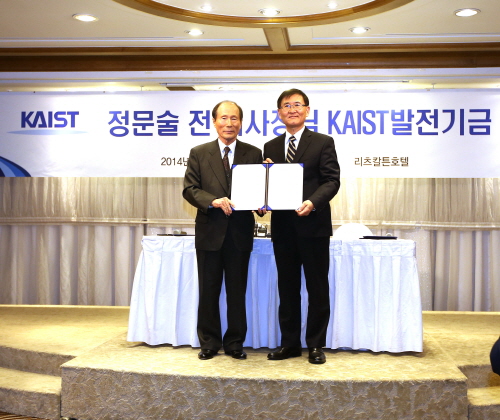 KAIST receives $20 million donation for futures studies
A retired businessman, Moon-Soul Chung, the former chief executive officer of Mirae, Inc., a semiconductor equipment company in Korea, today donated USD 20 million to the Graduate School of Future Strategy at KAIST.
It was Chung's second contribution to KAIST—his first donation of USD 28 million in 2001 supported the construction of the Bio and Brain Engineering building, a major research center on campus where biotechnology and information technology converge.
Established in 2013, the KAIST Graduate School of Future Strategy consists of three interdisciplinary graduate programs on future strategy, intellectual property, and science journalism. The Research Center for Future Strategy is an affiliate of the graduate school. KAIST is the first Korean university that offers an academic program granting a degree in futures studies.
The rapid advancement in science and technology today affects, profoundly and extensively, all corners of global society from education, politics, economy, and environment to resources, sustainability, and inequality. As we live in a highly interconnected, digitalized, and unpredictable world, analyzing the events, trends, patterns, and changes of the past and present, developing foresight, and mapping preferred futures have become more relevant than ever.
KAIST utilizes its strong tech-knowledge base in science and engineering to offer students a high quality education and training in futures thinking, skills, and methodologies to develop foresight and to plan future strategies for international relations, business and industry, national defense, science and technology, and new media. KAIST also anticipates helping government, business, public service, and non-profit organizations identify important issues and develop long-range implementation strategies to prepare for probable and preferred futures.
Moon-Soul Chung (left), the former CEO of Mirae Inc., and President Steve Kang (right), holding together the donation agreement in Seoul, January 10th, 2014
2014.01.13 View 9759
KAIST receives $20 million donation for futures studies
A retired businessman, Moon-Soul Chung, the former chief executive officer of Mirae, Inc., a semiconductor equipment company in Korea, today donated USD 20 million to the Graduate School of Future Strategy at KAIST.
It was Chung's second contribution to KAIST—his first donation of USD 28 million in 2001 supported the construction of the Bio and Brain Engineering building, a major research center on campus where biotechnology and information technology converge.
Established in 2013, the KAIST Graduate School of Future Strategy consists of three interdisciplinary graduate programs on future strategy, intellectual property, and science journalism. The Research Center for Future Strategy is an affiliate of the graduate school. KAIST is the first Korean university that offers an academic program granting a degree in futures studies.
The rapid advancement in science and technology today affects, profoundly and extensively, all corners of global society from education, politics, economy, and environment to resources, sustainability, and inequality. As we live in a highly interconnected, digitalized, and unpredictable world, analyzing the events, trends, patterns, and changes of the past and present, developing foresight, and mapping preferred futures have become more relevant than ever.
KAIST utilizes its strong tech-knowledge base in science and engineering to offer students a high quality education and training in futures thinking, skills, and methodologies to develop foresight and to plan future strategies for international relations, business and industry, national defense, science and technology, and new media. KAIST also anticipates helping government, business, public service, and non-profit organizations identify important issues and develop long-range implementation strategies to prepare for probable and preferred futures.
Moon-Soul Chung (left), the former CEO of Mirae Inc., and President Steve Kang (right), holding together the donation agreement in Seoul, January 10th, 2014
2014.01.13 View 9759 -
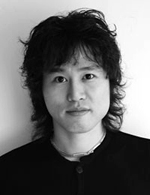 Professor Sang-Min received an award for scholar of the year from the KAISTian of the Year 2013
KAIST nominates a “Scholar of the Year” each year and presents the award to the recipient at a New Year’s opening ceremony. For the year 2013, Professor Sang-Min Bae of the Industrial Design Department at KAIST was named “KAIST Scholar of 2013” and received the award on January 2, 2014.
Professor Bae has been recognized for his design achievement in 2013: D’Light, a kinetic lighting that employs a transformable lampshade using flexible honeycomb structure, became one of the finalists in the living room and bedroom category of the International Design Excellence Award 2013 and was selected one of the best 100 for the 2013 Good Design Award. Users can easily change the shape and light intensity of the lamp by simply pivoting the lampshade with its small handle.
Professor Bae has also actively pursued his own philanthrophic projects through design: he has given the profits from the sales of his designs including D’Light directly toward a scholarship for needy children.
The Scholar of the Year award is presented to a faculty member or researcher at KAIST who has contributed to the advancement of science and technology such as publication of articles with influential research outcomes, invention of breakthrough technology, implementation of outstanding research projects, and improvement of public life. Professor Bae is the 13 th winner of the KAIST award.
The Korea Times, a leading English language newspaper in Korea, published an article on this award. For the article, please visit http://www.koreatimes.co.kr/www/news/people/2014/01/178_149117.html .
2014.01.09 View 12913
Professor Sang-Min received an award for scholar of the year from the KAISTian of the Year 2013
KAIST nominates a “Scholar of the Year” each year and presents the award to the recipient at a New Year’s opening ceremony. For the year 2013, Professor Sang-Min Bae of the Industrial Design Department at KAIST was named “KAIST Scholar of 2013” and received the award on January 2, 2014.
Professor Bae has been recognized for his design achievement in 2013: D’Light, a kinetic lighting that employs a transformable lampshade using flexible honeycomb structure, became one of the finalists in the living room and bedroom category of the International Design Excellence Award 2013 and was selected one of the best 100 for the 2013 Good Design Award. Users can easily change the shape and light intensity of the lamp by simply pivoting the lampshade with its small handle.
Professor Bae has also actively pursued his own philanthrophic projects through design: he has given the profits from the sales of his designs including D’Light directly toward a scholarship for needy children.
The Scholar of the Year award is presented to a faculty member or researcher at KAIST who has contributed to the advancement of science and technology such as publication of articles with influential research outcomes, invention of breakthrough technology, implementation of outstanding research projects, and improvement of public life. Professor Bae is the 13 th winner of the KAIST award.
The Korea Times, a leading English language newspaper in Korea, published an article on this award. For the article, please visit http://www.koreatimes.co.kr/www/news/people/2014/01/178_149117.html .
2014.01.09 View 12913